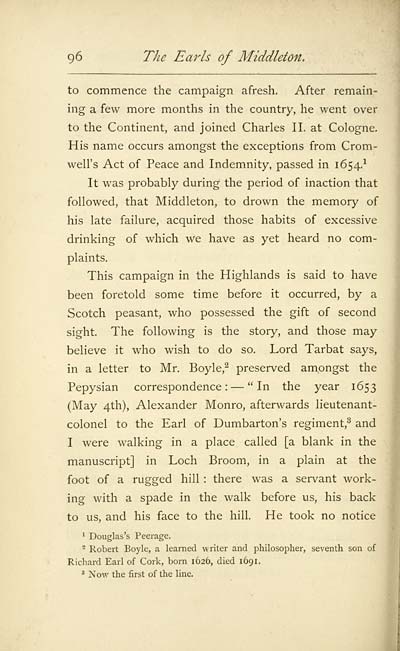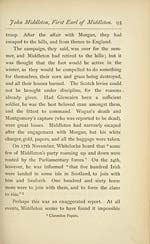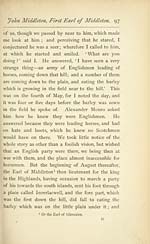Download files
Complete book:
Individual page:
Thumbnail gallery: Grid view | List view

96 The Earls of Middleton.
to commence the campaign afresh. After remain-
ing a few more months in the country, he went over
to the Continent, and joined Charles II. at Cologne.
His name occurs amongst the exceptions from Crom-
well's Act of Peace and Indemnity, passed in 1654. 1
It was probably during the period of inaction that
followed, that Middleton, to drown the memory of
his late failure, acquired those habits of excessive
drinking of which we have as yet heard no com-
plaints.
This campaign in the Highlands is said to have
been foretold some time before it occurred, by a
Scotch peasant, who possessed the gift of second
sight. The following is the story, and those may
believe it who wish to do so. Lord Tarbat says,
in a letter to Mr. Boyle, 2 preserved amongst the
Pepysian correspondence: — "In the year 1653
(May 4th), Alexander Monro, afterwards lieutenant-
colonel to the Earl of Dumbarton's regiment, 3 and
I were walking in a place called [a blank in the
manuscript] in Loch Broom, in a plain at the
foot of a rugged hill : there was a servant work-
ing with a spade in the walk before us, his back
to us, and his face to the hill. He took no notice
1 Douglas's Peerage.
2 Robert Boyle, a learned writer and philosopher, seventh son of
Richard Earl of Cork, born 1626, died 1691.
3 Now the first of the line.
to commence the campaign afresh. After remain-
ing a few more months in the country, he went over
to the Continent, and joined Charles II. at Cologne.
His name occurs amongst the exceptions from Crom-
well's Act of Peace and Indemnity, passed in 1654. 1
It was probably during the period of inaction that
followed, that Middleton, to drown the memory of
his late failure, acquired those habits of excessive
drinking of which we have as yet heard no com-
plaints.
This campaign in the Highlands is said to have
been foretold some time before it occurred, by a
Scotch peasant, who possessed the gift of second
sight. The following is the story, and those may
believe it who wish to do so. Lord Tarbat says,
in a letter to Mr. Boyle, 2 preserved amongst the
Pepysian correspondence: — "In the year 1653
(May 4th), Alexander Monro, afterwards lieutenant-
colonel to the Earl of Dumbarton's regiment, 3 and
I were walking in a place called [a blank in the
manuscript] in Loch Broom, in a plain at the
foot of a rugged hill : there was a servant work-
ing with a spade in the walk before us, his back
to us, and his face to the hill. He took no notice
1 Douglas's Peerage.
2 Robert Boyle, a learned writer and philosopher, seventh son of
Richard Earl of Cork, born 1626, died 1691.
3 Now the first of the line.
Set display mode to:
![]() Universal Viewer |
Universal Viewer | ![]() Mirador |
Large image | Transcription
Mirador |
Large image | Transcription
Images and transcriptions on this page, including medium image downloads, may be used under the Creative Commons Attribution 4.0 International Licence unless otherwise stated. ![]()
| Histories of Scottish families > Earls of Middleton, Lords of Clermont and of Fettercairn > (112) |
|---|
| Permanent URL | https://digital.nls.uk/95312323 |
|---|
| Description | A selection of almost 400 printed items relating to the history of Scottish families, mostly dating from the 19th and early 20th centuries. Includes memoirs, genealogies and clan histories, with a few produced by emigrant families. The earliest family history goes back to AD 916. |
|---|

